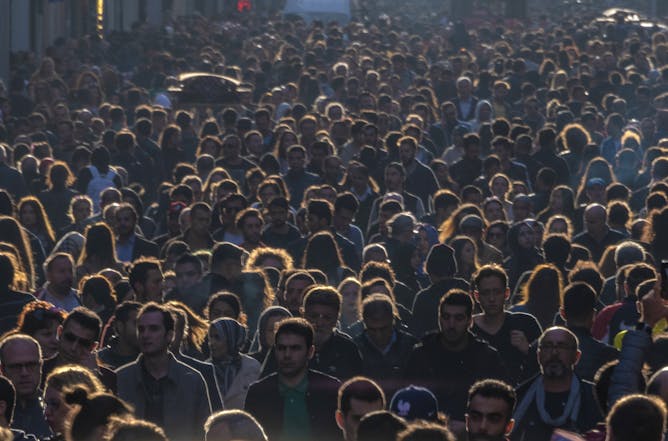|
|
|
|
I’ve lived in New York City off and on since I moved here for grad school in 2005. From the bars and restaurants to the 24-hour subway and Central Park, the city has always enthralled and inspired me. Even its downsides – the smells, the nonstop traffic and noise, pizza rats – have become reasons for loving the city all the more, like the way a partner’s most annoying habits grow oddly endearing.
That’s why it was startling to see NYC brought to a standstill last spring when the pandemic struck. Even now, my favorite hangouts remain shuttered, and the subway that services the “city that never sleeps” closes at 1 a.m. At least Central Park remains open for weekend runs, albeit masked. Many like me, upon seeing their beloved cities imperiled by a virus that flourishes in density as much as we do, are wondering: Can the city survive COVID-19?
Reassuringly, the answer is “yes.” Or so believe urban experts John Rennie Short of the University of Maryland, Baltimore County, and Michael Orlando of the University of Colorado, Denver, who have weighed in on what the post-pandemic future holds for cities.
Also today:
|
Bryan Keogh
Senior Editor, Economy + Business
|

|
|

Cities are breeding grounds for creativity – and infectious diseases.
Salvator Barki/Moment via Getty Images
John Rennie Short, University of Maryland, Baltimore County; Michael J. Orlando, University of Colorado Denver
Two scholars of cities explain why dense, urban areas will survive – and thrive – long after the pandemic ends, and even if they don't get a bailout.
|
Politics + Society
|
-
Sharece Thrower, Vanderbilt University
Executive orders aren't as unilateral as they seem. Here's how government keeps them in check.
-
H. Colleen Sinclair, Mississippi State University
Scholars who study dangerous speech have identified common themes that can lead to violence.
-
Sharon Austin, University of Florida
Georgia once had 'the South's most racist governor,' a man endorsed by the KKK. Now its senators are a Black pastor and a Jewish son of immigrants. A scholar of minority voters explains what happened.
|
|
Environment + Energy
|
-
Rachel Kyte, Tufts University
The former Federal Reserve chair has the experience and broad respect to get businesses to move on climate change and to lay the foundation for real and lasting progress.
|
|
Science + Technology
|
-
Ellen Furlong, Illinois Wesleyan University
Research shows the presence of dogs increases overall human well-being, which can come in handy in high-stress work environments like the White House.
-
Stephen Trumbo, University of Connecticut
If you think only humans engage in disinformation, think again. Here is a stunning example of a beetle manipulating the odors emitted from a rotting corpse to keep it hidden from competitors.
|
|
Economy + Business
|
-
Robert Gudmestad, Colorado State University
Although millions voted to put her face on the bill in an online poll, many still don't know the story of her life and the role faith played in it.
-
Katrina Kosec, Johns Hopkins University; Cecilia Hyunjung Mo, University of California, Berkeley
A new study explores how feelings of relative poverty can negatively affect gender dynamics among households.
|
|
Ethics + Religion
|
-
Ryan Burge, Eastern Illinois University
The number of self-described evangelicals as a share of US population has held steady for the past decade. What is different is that they appear to identify less with church and more with politics.
|
|
Health
|
-
Siobhán Mattison, University of New Mexico; Adam Z. Reynolds, University of New Mexico; Katherine Wander, Binghamton University, State University of New York
Living in societies with gender bias can harm women's health.
|
|
Video
|
-
Nathan Ahlgren, Clark University
A biologist explains what proteins do in viruses, how they interact with human cells, how the vaccine delivers mRNA into the cell and how antibodies protect us.
|
|
Arts + Culture
|
-
Jessica Floyd, Community College of Baltimore County
Crews sang the songs to ease the fears, anxieties and loneliness of daily life on merchant ships.
|
|
From our international editions
|
-
Frederik Pedersen, University of Aberdeen
The story of the 'Cadaver Synod' tells us that in some cases, even the departed can be held to account.
-
Binoy Kampmark, RMIT University
As her 16-year reign as German Chancellor comes to an end, Merkel will be remembered for her staunch centrism and her willingness to wait to sense the political mood - sometimes then changing course.
-
Rhoda E. Howard-Hassmann, Wilfrid Laurier University
The turn towards authoritarianism, xenophobia and racism in Western democracies makes it unlikely that former Western slave-trading nations will agree to reparations in the near future.
|
|
| |
| |
| |
| |
| |
| |
|
|
|
|
|
|
|